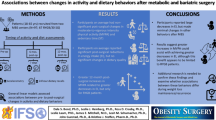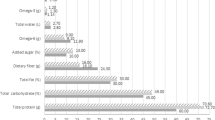Abstract
Objective
To assess whether a healthy dietary pattern or physical activity after bariatric surgery mediates the effects of surgery on weight loss, the quality of life, or food tolerance.
Methods
A prospective observational study conducted in the context of a randomized controlled trial. We assessed the extent to which increasing or decreasing adherence to the Mediterranean diet (MedDiet)—assessed by MEDAS (Mediterranean Diet Adherence Screener)—and of increasing or decreasing physical activity (PA)—assessed with the Short Questionnaire of International PA (IPAQ-Short Q)—after bariatric surgery affected changes in weight, body mass index (BMI), quality of life (Moorehead-Arlet Questionnaire), and food tolerance (Suter test). Assessments were recorded at baseline and quarterly up to 12 months of surgery.
Results
Seventy-eight morbidly obese participants undergoing bariatric surgery were assessed up to 1 year after surgery. Those individuals who increased adherence to MedDiet showed a significantly higher mean of total weight loss percentage than those who decreased or maintained their adherence during follow-up: 37.6% (35.5–39.8) versus 34.1% (31.8–36.5) (p = 0.036). No significant differences were observed in changes in weight or BMI comparing individuals who increased their PA versus those who maintained or decreased PA, nor in quality of life or food tolerance between those individuals who increased versus those who decreased adherence to MedDiet or PA during the follow-up.
Conclusions
After bariatric surgery, morbidly obese subjects present greater weight loss if they adhere to the MedDiet. PA after surgery is not associated with the magnitude of weight loss nor the quality of life and tolerance to diet.





Similar content being viewed by others

References
Aranceta-Bartrina J, Pérez-Rodrigo C, Alberdi-Aresti G, et al. Prevalencia de obesidad general y obesidad abdominal en la población adulta española (25–64 años) 2014–2015: estudio ENPE. 2017;69(6):579–87.
Prospective Studies Collaboration, Whitlock G, Lewington S, et al. Body-mass index and cause-specific mortality in 900 000 adults: collaborative analyses of 57 prospective studies. Lancet. 2009;373(9669):1083–96.
Oria HE, Moorehead MK, et al. Bariatric Analysis and Reporting Outcome System (BAROS). Obes Surg. 1998;8(5):487–99.
Moorehead MK, Ardelt-Gattinger E, Lechner H, et al. The validation of the Moorehead-Ardelt Quality of Life Questionnaire II. Obes Surg. 2003;13(5):684–92.
Suter M, Calmes JM, Paroz A, et al. A new questionnaire for quick assessment of food tolerance after bariatric surgery. Obes Surg. 2007;17(1):2–8.
Ramón JM, Gustavo C. Dorcaratto D, et al. Calidad de la ingesta alimentaria tras la cirugía bariátrica: gastrectomía vertical vs bypass gástrico. Cir Esp 2012;90 (2):95-101.
Giugliano D, Esposito K. Mediterranean diet and metabolic diseases. Curr Opin Lipidol. 2008;19:63–8.
Salas-Salvadó J, Díaz-López A, Ruiz-Canela M, et al. Effect of a lifestyle intervention program with energy-restricted mediterranean diet and exercise on weight loss and cardiovascular risk factors: one-year results of the PREDIMED-Plus Trial. Diabetes Care. 2018:1–12.
Ruiz-Tovar J, Boix E, Bozhychko M, et al. Adherencia pre y postoperatoria a la dieta mediterránea y su efecto sobre la pérdida de peso y el perfil lipídico en pacientes obesos mórbidos sometidos a gastrectomía vertical como procedimiento bariátrico. Nutr Hosp. 2014;30(4):756–62.
Fontana AD, Lopes AD, Lunardi AC. Bariatric surgery associated with practice of moderate to intense physical activity related to weight loss, activity level in daily life, dyspnea, and quality of life of sedentary individuals with morbid obesity: a prospective longitudinal study. Obes Surg. 2019;29:2442–8. https://doi.org/10.1007/s11695-019-03859-8.
Esposito K, Kastorini C-M, Panagiotakos DB, et al. Mediterranean diet and weight loss: meta-analysis of randomized controlled trials. Metab Syndr Relat Disord. 2011;9(1):1–12.
Schröder H, Fitó M, Estruch R, et al. A short screener is valid for assessing Mediterranean diet adherence among older Spanish men and women. J Nutr. 2011 Jun;141(6):1140–5.
Mantilla SC, Gómez-Conesa A. El Cuestionario Internacional de Actividad Física . Un instrumento adecuado en el seguimiento de la actividad física poblacional. Rev Iberoam Fisioter Kinesol. 2007;10(1):48–52. Revisión
Román B, Ribas L, Ngo J, et al. Validación en población catalana del cuestionario internacional de actividad física. Gac Sanit. 2013;27(3):254–7.
Ramón JM, González CG, Dorcaratto D, et al. Quality of food intake after bariatric surgery: vertical gastrectomy versus gastric bypass. Cir Esp. 2012;90(2):95–101.
Boan J, Kolotkin RL, Westman EC, et al. Binge eating, quality of life and physical activity improve after Roux-en-Y gastric bypass for morbid obesity. Obes Surg. 2004;14(3):341–8.
Hatoum IJ, Stein HK, Merrifield BF, et al. Capacity for physical activity predicts weight loss after roux-en-Y gastric bypass. Obesity. 2009;17(1):92–9.
Bellicha A, Ciangura C, Poitou C, et al. Effectiveness of exercise training after bariatric surgery-a systematic literature review and meta-analysis. Obes Rev. 2018;10
Johns DJ, Hartmann-Boyce J, Jebb SA, et al. Behavioural Weight Management Review Group. Diet or exercise interventions vs combined behavioral weight management programs: a systematic review and meta-analysis of direct comparisons. J Acad Nutr Diet. 2014;114(10):1557–68.
Espinet Coll E, López-Nava Breviere G, Nebreda Durán J, et al. Spanish consensus document on bariatric endoscopy. Part 1. General considerations. Rev Esp Enferm Dig. 2018;110(6):386–99. https://doi.org/10.17235/reed.2018.4503/2016.
Ramos C, Bandeira AA, Ramos A, et al. Avaliação da qualidade de vida, perda de peso e comorbidades de pacientes submetidos à cirurgia bariátrica. Rev Col Bras Cir. 2018;45(3):1–9.
Costa RCNC, Yamaguchi N, Santo MA, et al. Outcomes on quality of life, weight loss, and comorbidities after roux-en-y gastric bypass. Arq Gastroenterol. 2014;3:165–70.
Hachem A, Brennan L. Quality of life outcomes of bariatric surgery: a systematic review. Obes Surg. 2016 Feb;26(2):395–409. Review
Stumpf MA, Rodrigues MR, Kluthcovsky AC, et al. Analysis of food tolerance in patients submitted to bariatric surgery using the questionnaire quality of alimentation. Arq Bras Cir Dig. 2015;28:79–83.
Ruiz-Tovar J, Bozhychko M, Del-Campo JM, et al. Food tolerance and quality of alimentation following laparoscopic sleeve gastrectomy calibrated with a 50-Fr bougie: long-term results. J Laparoendosc Adv Surg Tech A. 2018;28(6):721–5.
Freeman RA, Overs SE, Zarshenas N, et al. Food tolerance and diet quality following adjustable gastric banding, sleeve gastrectomy and Roux-en-Y gastric bypass. Obes Res Clin Pract. 2014;8(2):e183–91.
Funding
This study has been funded in part by Nestlé Health Science.
Author information
Authors and Affiliations
Corresponding authors
Ethics declarations
All procedures performed in studies involving human participants were in accordance with the ethical standards of the institutional and/or national research committee and with the 1964 Helsinki declaration and its later amendments or comparable ethical standards.
Conflict of Interest
Author 4 reports receiving a grant from Nestlé thorough his institution. The other authors declare that they have no conflict of interest.
Informed Consent
Informed consent was obtained from all individual participants who took part in the study.
Disclaimer
The funder played no part in data collection, analysis, or interpretation of the results. Neither has it influenced the publication of these results.
Additional information
Publisher’s Note
Springer Nature remains neutral with regard to jurisdictional claims in published maps and institutional affiliations.
Rights and permissions
About this article
Cite this article
Gils Contreras, A., Bonada Sanjaume, A., Becerra-Tomás, N. et al. Adherence to Mediterranean Diet or Physical Activity After Bariatric Surgery and Its Effects on Weight Loss, Quality of Life, and Food Tolerance. OBES SURG 30, 687–696 (2020). https://doi.org/10.1007/s11695-019-04242-3
Published:
Issue Date:
DOI: https://doi.org/10.1007/s11695-019-04242-3



